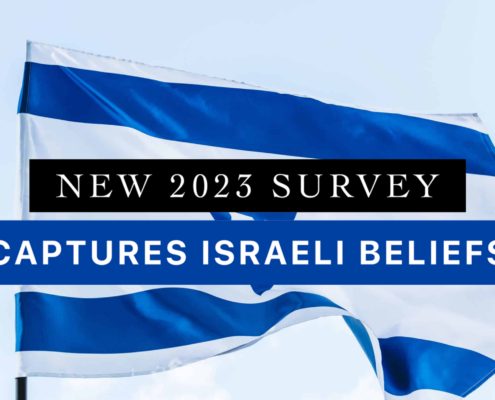Excerpt from Isaiah 53 Explained, by Dr Mitch Glaser
Chapter 7: Atonement
Introduction
The idea of atonement is one of the most difficult in the Bible to explain; however, it is also one of the most important of all spiritual truths. It would be impossible to grasp the meaning of Isaiah 53 without examining the meaning of atonement.
Surveys of the modern Jewish community indicate that most Jewish people do something to acknowledge the Day of Atonement—Yom Kippur. But do we really understand what this means? We know it involves forgiving others and being forgiven by God (the one day a year we believe in God—with or without evidence!), but most people would have a difficult time defining and explaining the idea of atonement.
Both Judaism and Christianity hold this important teaching in common and both faiths are built on this concept, so it is very important for us to understand it! The idea that the Servant dies for our sins cannot be understood without grasping what the Bible teaches about atonement.
Atonement, especially substitutionary atonement, is understandably difficult for the modern mind to grasp, as it is founded upon certain presuppositions that are not widely accepted today.
The Presuppositions of Atonement
The first idea essential to the concept of atonement is that there is a personal God who made us, loves us, desires to have a relationship with us and who also holds us accountable for our actions. This personal God is holy and righteous and created beauty, love and all the things we enjoy in this life. He gave us parameters for our behavior so that we do not misuse all the blessings He has given us. But for some reason, no moralist or philosopher has been able adequately to explain why we continually stray from the divine guidelines found in the Bible. Ignoring these guidelines is called sin.
The second presupposition foundational to understanding atonement is that people find it difficult—even impossible—to meet God’s standards. The Bible describes this “missing the mark” as sin, and claims that sin is endemic to the human condition—no one is perfect. If sin were not universal, then atonement would be optional or only the worst among us would need it. Rather, according to the Bible and also the Jewish religion, we all need atonement.
There are a variety of ways to look for atonement. Some of us try to find atonement through seeking or earning the forgiveness of others. There’s nothing wrong with making amends, and as Jews we know that at least once a year this is a major personal project! But making amends is different from receiving atonement.
We might try to earn atonement by personal sacrifice: volunteering or giving money to philanthropy. These efforts have great merit, but once we stop doing them, our sense of peace wanes, so that we live on a perpetual treadmill, seeking atonement generated by our own efforts. We innately know we need to make atonement for the wrongs we have done, but it is in trying that we experience our deepest sense of failure.
Atonement—removing the alienation and guilt that keep us from a close personal relationship with our Creator—only comes about when the problem of sin is removed. From the Bible’s point of view, no one among us is capable of achieving the depth of repentance that would enable us to meet God’s holy standards.
Once we accept the presupposition that there is a personal God, and that we fail to meet His standards, we then come to a third presupposition: atonement begins and ends with God’s efforts, and our responsibility is simply to accept what God has accomplished on our behalf. In other words, atonement from the Bible’s perspective is an unmerited and unearned gift.
This is the context for under-standing what the Servant described in Isaiah 53 did for you and me. The chapter predicts that God would send His innocent Servant to die in our place and pay the penalty of death, which we deserved. And through his death and resurrection, God’s wrath and judgment for our sin would be removed!
Conclusion
Only through accepting God’s atonement will we experience peace in our relationship with our Creator— a peace that will enable us to face life and even death with a confidence that comes from an intimate relationship with the God who made us.
The choice is yours!





